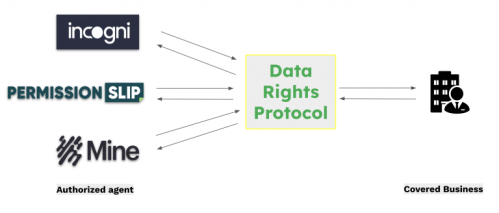
Since we started our work on the Data Rights Protocol (DRP), companies that need to comply with privacy laws have regularly reached out asking what the protocol can do for their business. There are numerous benefits to businesses that choose to adopt the DRP: it’s an efficient, cost-effective, and reliable solution for managing the ever-growing number of consumer data rights requests, especially for companies that must be responsive to multiple authorized agents.
In this blog post, we articulate 5 ways the DRP can help make a company’s compliance program faster, cheaper, and better than it is today:
- API-driven request processing: The DRP utilizes a standard API for receiving Authorized Agent requests, making it faster, cheaper, and more efficient than the email and form submission mechanisms widely used today. The DRP’s API-driven approach streamlines the process of managing requests, resulting in significant time and cost savings for your business. Additionally, it minimizes the risk of human error and ensures more consistent and accurate handling of requests.
- A common API across multiple authorized agents: The complexity of managing multiple APIs for different agents. This approach ensures that key technical procedures, business practices, legal processes, and other activities related to exchanging data rights requests can be managed through a single interface and system. Moreover, when the API is updated, all businesses using the Data Rights Protocol will automatically benefit from the improvements, reducing maintenance overhead and ensuring seamless integration.
- Bolstered compliance: The DRP carefully supports current legal requirements (statutory and regulatory) in its technical spec and deployment process. By simplifying and streamlining manual reviews of agent requests, the DRP helps privacy, legal, and compliance teams establish standard operating procedures that can remain stable over time. This also enables businesses to demonstrate a proactive approach to data privacy regulations and showcase their commitment to consumer rights.
- Option to reduce consumer identity verification costs: Businesses that implement DRP can save on consumer identity verification costs by relying on the agent’s verification processes instead of needing to initiate their own. Authorized agents commonly verify consumer identity in various ways as part of their standard onboarding of new users. Built into the DRP is a signal for whether a given identity attribute like phone or email has been properly verified by the Authorized Agent. By relying on the DRP’s agent identity attestations, businesses can avoid the cost, friction, and time currently spent on verifying the same attributes independently. This can have the additional positive effect of improving the consumer experience by reducing the friction users encounter when asked to verify their identity by multiple parties for the same requests. We believe that adopting the DRP and relying on agent verification processes can lead to significant cost savings for businesses. A recent informal poll revealed that one out of three businesses would consider using identity attestations from an Authorized Agent instead of conducting their own verification processes. This suggests that the DRP’s approach to identity verification has the potential to greatly impact how businesses handle consumer verification.
- Major privacy compliance software companies are DRP implementers, which eases adoption Several privacy infrastructure providers (PIPs) are already implementing the DRP, which can help facilitate rapid adoption and propagation of the protocol’s benefits to many businesses. Current privacy infrastructure DRP implementers include DataGrail, Ethyca, OneTrust, Sourcepoint, Transcend, and WireWheel; we expect this list to grow with time. As implementers, privacy infrastructure provider companies extend the benefits of the DRP to any of their customers – which makes it easier for companies that work with them to adopt the protocol without needing to invest in ground-up development. The Data Rights Protocol offers a wide array of benefits for businesses looking to streamline their data rights request processes while maintaining compliance with current legal requirements. By implementing the DRP, businesses can save time, reduce costs, and ensure a more efficient and secure approach to managing consumer data rights.
To learn more about how you can use the DRP for your business, please consult the Data Rights Protocol for Businesses page or reach out directly at datarightsprotocol@cr.consumer.org.